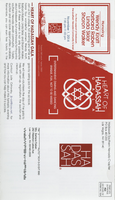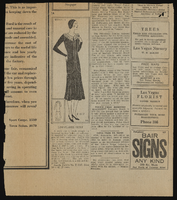Search the Special Collections and Archives Portal
Search Results
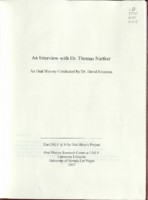
Transcript of interview with Dr. Thomas Nartker by Dr. David Emerson, November 13, 2006
Date
Archival Collection
Description
Text
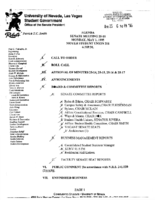
Meeting minutes for Consolidated Student Senate University of Nevada, Las Vegas, May 01, 1995
Date
Archival Collection
Description
Text

Meeting minutes for Consolidated Student Senate, University of Nevada, Las Vegas, May 03, 1983
Date
Archival Collection
Description
Text

David Ober interview, October 11, 2017: transcript
Date
Archival Collection
Description
Tucson, Arizona, native David Ober moved to Las Vegas twice. He arrived reluctantly the first time in 1978 with his parents as a high-school student, when his father, Hal Ober, came to Las Vegas to begin building and marketing the U.S. Home (now Lennar) brand. While the elder Ober soon left U.S. Home to open his own home-building business, R.A. Homes, his youngest child left Las Vegas shortly after his high school graduation to return to his native Tucson, follow in the footsteps of his siblings, and attend the University of Arizona. After graduating from the University of Arizona David Ober opened his own mortgage company and began building a life in Phoenix. In the late 1980s he agreed to take a large pay cut, return to Las Vegas, and learn his father's business from the ground up. At the time, Hal Ober was developing his award-winning, master-planned community, Desert Shores. David Ober, the youngest of the five children of Hal and D'Vorre (Dee) Ober, agreed to participate in the
Text
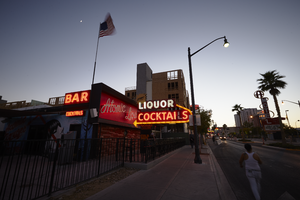
Photographs of Atomic Liquors at dusk, Las Vegas (Nev.), June 28, 2017
Date
Archival Collection
Description
Site address: 927 Fremont St
Sign owner: 100 10th Street LLC
Sign details: Property sold by Lance Johns to 100 10th Street LLC in 2014 for $3,480,000. Recent addition to property in 2017 (927 Fremont Street).
Sign condition: 3 - Decent: neon in great condition, paint chipping off and some bulbs not repaired
Sign form: Directional Monument sign, back to back "Double sided"
Sign-specific description: Uses directional tool of an arrow, has chasing animation in the arrow with incandescent bulbs. It has blade like additions to it for the word "Liquor" and "Cocktails", each word on its own blade which are parallel to the ground, they are painted red. The word "Atomic" sits on the top in a comic style "blast" shaped bubble painted yellow. "Packaged liquors" and "Cold beer" painted on the base structure of the sign. Bulbs glow yellow, "Liquor" glows blue, "Cocktails" glows red, "Atomic" is not lit.
Sign - type of display: Neon and incandescent
Sign - media: Steel
Sign animation: Chaser effect with bulbs
Sign environment: Property surrounded by other bars/clubs and motels.
Sign - date of installation: c. 1952
Sign - artistic significance: 1950s atomic testing theme - popular due to test sight 65 miles north of city
Survey - research locations: Bar website, www.roadarch.com, owner
Surveyor: Danny Jacobs
Survey - date completed: 2017-08-12
Sign keywords: Neon; Incandescent; Steel; Chasing; Directional; Monument sign; Back to back; Fascia; Floating Mount Letters
Mixed Content
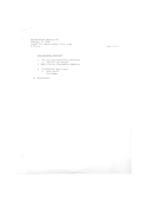
Meeting minutes for Consolidated Student Senate, University of Nevada, Las Vegas, February 21, 1978
Date
Archival Collection
Description
Text
Audio recording clip of interview with D. D. Cotton by Claytee D. White, February 14, 1997
Date
Archival Collection
Description
Part of an interview with D. D. Cotton by Claytee White on February 14, 1997. Cotton discusses challenges faced by women dealers and her work as a dancer and dealer in a number of casinos.
Sound

